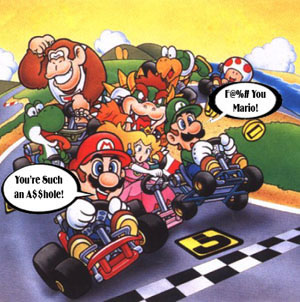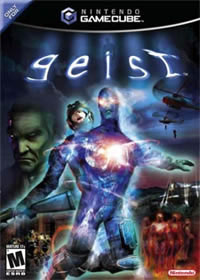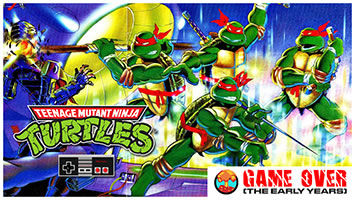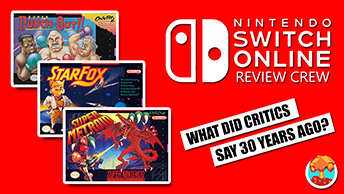- CLASSIC MAGAZINES
- REVIEW CREW
A show recapping what critics thought back
when classic games first came out! - NEXT GENERATION'S BEST & WORST
From the worst 1-star reviews to the best
5-stars can offer, this is Next Generation! - NINTENDO POWER (ARCHIVE)
Experience a variety of shows looking at the
often baffling history of Nintendo Power! - MAGAZINE RETROSPECTIVE
We're looking at the absolutely true history of
some of the most iconic game magazines ever! - SUPER PLAY'S TOP 600
The longest and most ambitious Super NES
countdown on the internet! - THEY SAID WHAT?
Debunking predictions and gossip found
in classic video game magazines! - NEXT GENERATION UNCOVERED
Cyril is back in this spin-off series, featuring the
cover critic review the art of Next Generation! - HARDCORE GAMER MAGAZING (PDF ISSUES)
Download all 36 issues of Hardcore Gamer
Magazine and relive the fun in PDF form!
- REVIEW CREW
- ELECTRONIC GAMING MONTHLY
- ELECTRONIC GAMING MONTHLY RANKS
From Mario to Sonic to Street Fighter, EGM
ranks classic game franchises and consoles! - ELECTRONIC GAMING MONTHLY BEST & WORST
Counting down EGM’s best and worst reviews
going year by year, from 1989 – 2009! - ELECTRONIC GAMING BEST & WORST AWARDS
11-part video series chronicling the ups and
downs of EGM’s Best & Worst Awards!
- ELECTRONIC GAMING MONTHLY RANKS
- GAME HISTORY
- GAME OVER: STORY BREAKDOWNS
Long-running series breaking down game
stories and analyzing their endings! - A BRIEF HISTORY OF GAMING w/ [NAME HERE]
Real history presented in a fun and pithy
format from a variety of game historians! - THE BLACK SHEEP
A series looking back at the black sheep
entries in popular game franchises! - INSTANT EXPERT
Everything you could possibly want to know
about a wide variety of gaming topics! - FREEZE FRAME
When something familiar happens in the games
industry, we're there to take a picture! - I'VE GOT YOUR NUMBER
Learn real video game history through a series
of number-themed episodes, starting at zero! - GREAT MOMENTS IN BAD ACTING
A joyous celebration of some of gaming's
absolute worst voice acting!
- GAME OVER: STORY BREAKDOWNS
- POPULAR SHOWS
- DG NEWS w/ LORNE RISELEY
Newsman Lorne Riseley hosts a regular
series looking at the hottest gaming news! - REVIEW REWIND
Cyril replays a game he reviewed 10+ years
ago to see if he got it right or wrong! - ON-RUNNING FEUDS
Defunct Games' longest-running show, with
editorials, observations and other fun oddities! - DEFUNCT GAMES QUIZ (ARCHIVE)
From online quizzes to game shows, we're
putting your video game knowledge to the test!- QUIZ: ONLINE PASS
Take a weekly quiz to see how well you know
the news and current gaming events! - QUIZ: KNOW THE GAME
One-on-one quiz show where contestants
find out if they actually know classic games! - QUIZ: THE LEADERBOARD
Can you guess the game based on the classic
review? Find out with The Leaderboard!
- QUIZ: ONLINE PASS
- DEFUNCT GAMES VS.
Cyril and the Defunct Games staff isn't afraid
to choose their favorite games and more! - CYRIL READS WORLDS OF POWER
Defunct Games recreates classic game
novelizations through the audio book format!
- DG NEWS w/ LORNE RISELEY
- COMEDY
- GAME EXPECTANCY
How long will your favorite hero live? We crunch
the numbers in this series about dying! - VIDEO GAME ADVICE
Famous game characters answer real personal
advice questions with a humorous slant! - FAKE GAMES: GUERILLA SCRAPBOOK
A long-running series about fake games and
the people who love them (covers included)! - WORST GAME EVER
A contest that attempts to create the worst
video game ever made, complete with covers! - LEVEL 1 STORIES
Literature based on the first stages of some
of your favorite classic video games! - THE COVER CRITIC
One of Defunct Games' earliest shows, Cover
Critic digs up some of the worst box art ever! - COMMERCIAL BREAK
Take a trip through some of the best and
worst video game advertisements of all time! - COMIC BOOK MODS
You've never seen comics like this before.
A curious mix of rewritten video game comics!
- GAME EXPECTANCY
- SERIES ARCHIVE
- NINTENDO SWITCH ONLINE ARCHIVE
A regularly-updated list of every Nintendo
Switch Online release, plus links to review! - PLAYSTATION PLUS CLASSIC ARCHIVE
A comprehensive list of every PlayStation
Plus classic release, including links! - RETRO-BIT PUBLISHING ARCHIVE
A regularly-updated list of every Retro-Bit
game released! - REVIEW MARATHONS w/ ADAM WALLACE
Join critic Adam Wallace as he takes us on a
classic review marathon with different themes!- DEFUNCT GAMES GOLF CLUB
Adam Wallace takes to the links to slice his way
through 72 classic golf game reviews! - 007 IN PIXELS
Adam Wallace takes on the world's greatest spy
as he reviews 15 weeks of James Bond games! - A SALUTE TO VAMPIRES
Adam Wallace is sinking his teeth into a series
covering Castlevania, BloodRayne and more! - CAPCOM'S CURSE
Adam Wallace is celebrating 13 days of Halloween
with a line-up of Capcom's scariest games! - THE FALL OF SUPERMAN
Adam Wallace is a man of steel for playing
some of the absolute worst Superman games! - THE 31 GAMES OF HALLOWEEN
Adam Wallace spends every day of October afraid
as he reviews some of the scariest games ever! - 12 WEEKS OF STAR TREK
Adam Wallace boldly goes where no critic has
gone before in this Star Trek marathon!
- DEFUNCT GAMES GOLF CLUB
- DAYS OF CHRISTMAS (ARCHIVE)
Annual holiday series with themed-episodes
that date all the way back to 2001!- 2015: 30 Ridiculous Retro Rumors
- 2014: 29 Magazines of Christmas
- 2013: 29 Questionable Power-Ups of Christmas
- 2012: 34 Theme Songs of Christmas
- 2011: 32 Game Endings of Christmas
- 2010: 31 Bonus Levels of Christmas
- 2009: 30 Genres of Christmas
- 2008: 29 Controls of Christmas
- 2007: 34 Cliches of Christmas
- 2006: 33 Consoles of Christmas
- 2005: 32 Articles of Christmas
- 2004: 31 Websites of Christmas
- 2003: 29 Issues of Christmas
- 2002: 28 Years of Christmas
- 2001: 33 Days of Christmas
- NINTENDO SWITCH ONLINE ARCHIVE
- REVIEW ARCHIVE
- FULL ARCHIVE
A Fight over Gamers First Amendment Rights

If you think the characters in Deadwood use a lot of profanity, then you haven't experienced Halo 2 online yet!
That's right, while Jack Thompson and his ilk are ready to condemn video games for their violence, sex, and criminal behavior, Nintendo and Sony are secretly doing their part to stamp out profanity, racism, homophobia, and sexism. Both companies have (quietly) announced that they would be addressing the concerns of bad language, but its how they've decided to combat this new terror that has some people a tad concerned.
If you haven't played games online lately chances are you don't know what the fuss is about, but believe me when I tell you that it often seems like you're playing with and against the cast of HBO's Deadwood. It's common to have a simple game of Halo 2 turn into immature name calling, racial slurs, and other hateful comments. There are times where you have to wonder if the people are being serious, or if they're all trying out for some strange Andrew Dice Clay sound-a-like contest.

I suppose it's something like this Nintendo is desperately trying to avoid!
Citing "safety reasons" as their main concern, Nintendo has decided that their first party titles will have no voice communication what so ever. Nintendo doesn't mind if you play games with your friends online ... they just don't want you to trash talk each other while doing it! "We need to be entirely confident that there can be no untoward activity," says a Nintendo product manager, "pure gameplay."
Of course, it's not like Sony's portable allows you to talk to each other while playing games. So far the PSP has a handful of online titles, but

Sometimes Nintendo makes it seem like they cannot connect with adult gamers!

Maybe this isn't what they meant by "safety reasons!"
Obviously gamers will be able to write comments back and forth using the Nintendo DS' touch screen abilities, but it's the microphone that gets the least amount of love on that system. Just about every game on the DS uses the touch screen, yet the microphone is only used as a gimmick ... or not at all. If ever there was a reason for a built in microphone it's to allow you to chat with your friends online, that way you won't have to scribble out comments while in the middle of an exciting Mario Kart battle.
Sony, on the other hand, doesn't seem to have a problem with allowing people to talk to each other online. Just about all of their online titles (with the exception of their earliest efforts) have offered some form of microphone support, which certainly helped sell thousands (if not millions) of third party USB headsets. But just because you can say whatever you want to the person on your team in SOCOM 3, it doesn't mean they aren't trying their hardest to get rid of what they deem to be offensive language.

By making President Bush a "bad word," it would appear as Sony has taken a political side!
This is the type of thing Sony (and other companies) have been toying with for years, so it should come as no surprise that they are doing whatever they can to improve on the "vulgarity filter" idea. But so far these kinds of filters have proven to be problematic

The answer is not less control, it's more
control!
For example, the program might censor the word "basement" simply because the word "semen" can be found if you look at the word long enough (a common practice in Phantasy Star Online). Sony's own SOCOM 1 and 2 had similar problems, words like "unless," "neutral," "twisted," and even "President Bush" all came out looking like nothing more than numbers and symbols thanks to Sony's "vulgarity filter."
Playing games online is a lot like going outside, you're going to find a lot of friendly faces on your journey, but there are also going to meet up with your fair share of people that offend your sense of humanity. Thankfully with most of today's online games you are able to mute (and report) just about anybody that calls you names, uses racial slurs, or does anything to offend you. It's not a perfect solution to the problem, but it does allow you to talk to friendly voices in peace, which is better than not being able to talk at all.

It's always fun to have people around to play with, but sometimes your friends can't be in the same room!
Perhaps the answer lies not in restricting everybody, but offering more options and controls. Perhaps it's time to let parents choose the type of online experience their kid has (possibly by having a lock on the voice chat, which but can still get online otherwise), or how about easier control over who we can and can't hear. It seems like there are solutions to the problem that don't involve going all the way to the extreme and banning voice communication for everybody. It doesn't matter what company you are, the answer comes in the way of giving us gamers choices, not making up our minds for us.
HOME |
CONTACT |
NOW HIRING |
WHAT IS DEFUNCT GAMES? |
NINTENDO SWITCH ONLINE |
RETRO-BIT PUBLISHING
Retro-Bit |
Switch Planet |
The Halcyon Show |
Same Name, Different Game |
Dragnix |
Press the Buttons
Game Zone Online | Hardcore Gamer | The Dreamcast Junkyard | Video Game Blogger
Dr Strife | Games For Lunch | Mondo Cool Cast | Boxed Pixels | Sega CD Universe | Gaming Trend
Game Zone Online | Hardcore Gamer | The Dreamcast Junkyard | Video Game Blogger
Dr Strife | Games For Lunch | Mondo Cool Cast | Boxed Pixels | Sega CD Universe | Gaming Trend
Copyright © 2001-2025 Defunct Games
All rights reserved. All trademarks are properties of their respective owners.
All rights reserved. All trademarks are properties of their respective owners.
























